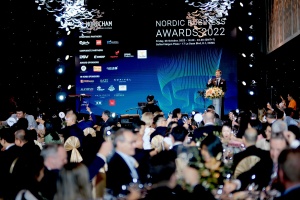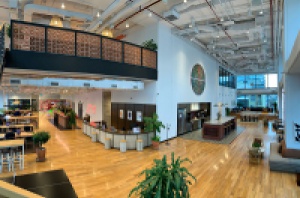Living up to the Nordic model
Vietnam’s focus on greener and sustainable development has been much inspired by the Nordic model. Can you share the areas that Nordic companies are interested in Vietnam in the green sector?
 |
| Zung Nguyen, executive director of the Nordic Chamber of Commerce Vietnam (NordCham) |
In recent years, the growing presence of Nordic companies in Vietnam has introduced sustainability models and expertise. These practices and insights are positioned to significantly advance Vietnam on its path towards a green economy. These companies’ contributions extend across pivotal sectors, with a strong emphasis on fostering a circular economy.
Norway, Sweden, Denmark, and Finland have successfully integrated circular principles into their economies, emphasising resource efficiency, waste reduction, and responsible consumption. By studying Nordic experiences and learning from their strategies, Vietnam can gain valuable insights into building a circular economy that prioritises environmental preservation, economic growth, and long-term sustainability.
First off, Nordic companies have a long history and passion to deliver green and sustainable products, logistics and energy, and have been the global leaders in many of these areas, particularly the likes of offshore wind, establishing the first commercial offshore wind farm in 1990 in Denmark. The Nordic companies also possess some of the world’s largest wind turbine manufacturers, and European offshore wind hubs.
These countries have actively driven the ambition to reduce reliance on fossil-fuels and the impacts that mining/exploiting and burning these can have on the environment, both directly and indirectly, and invested in supporting technologies that seek to resolve this.
The Nordic model is very much one that works backwards, focusing on what is needed to be delivered (a product, an operation, or a development such as a renewable energy project), and then to consider how such an item needs to be designed in a way that is site-specific to the environment both physically, biologically, and socially.
Meanwhile, Vietnam faces mounting challenges stemming from rapid urbanisation with waste and increased plastic consumption across sectors. However, inadequate waste management has resulted in widespread wasted and single-use plastic pollution. Annually, Vietnam generates 25.5 million tonnes of waste, with 75 per cent ending up in landfills. An additional 3.1 million metric tonnes of plastic waste are illegally dumped, contributing to Vietnam’s ranking as a major ocean plastic polluter. Beyond environmental concerns, waste management poses a significant economic burden, with cities like Hanoi and Ho Chi Minh City allocating substantial budgets for waste collection and disposal.
Nordic companies have shown interest in providing eco-friendly waste management solutions. Tomra is looking to provide advanced recycling technologies and machines for the collection and sorting of recyclable materials. Valmet’s involvement in waste-to-energy projects typically includes providing technologies and solutions for converting waste materials into renewable energy sources like biofuels and biogas. And Eagle Technology’s WASTX Plastic offers a groundbreaking solution, employing high-temperature pyrolysis to convert plastic waste into energy.
In green building and infrastructure, the growth of Vietnam’s middle-income class and its emergence as a manufacturing hub have led to a booming demand in the construction sector. The importance of green building and sustainable infrastructure has never been more evident.
Nordic companies are at the forefront of this effort. Key players such as Sweco, KAZE, and DK Engineering are advancing sustainable construction development in the country. They bring their expertise to design and implement eco-friendly building solutions. Notable Nordic investors, including the Lego factory with its carbon-neutral aspirations, as well as ECCO, Tetra Pak, AssaAbloy, Trelleborg, and Pandora, all pursue green certification, aligning their materials, principles, and operations with sustainable standards.
In logistics, Vietnam’s transformation into a burgeoning manufacturing hub and the rapid growth of its e-commerce sector have elevated the significance of this industry within the country’s economy. Projections indicate that by 2025, this sector’s growth rate will surpass that of Vietnam’s overall GDP. Given its status as an export-driven economy, the movement of goods, encompassing the import of raw materials and the export of finished products, continues to surge.
Within this dynamic logistics landscape, Nordic companies like Eimskip, DSV, and Maersk hold the potential to make substantial contributions to promoting sustainable logistics practices in Vietnam. Their initiatives may involve route optimisation, the adoption of green technologies like electric and hybrid vehicles, transitioning to alternative fuels such as electricity and hydrogen, and fostering intermodal transport. Strategies to enhance sustainability further encompass implementing digital supply chain solutions, providing training and education on sustainable practices, and promoting collaboration with local stakeholders.
What are the main challenges facing Nordic firms’ sustainable development and what does Vietnam need to encourage businesses to develop sustainably?
These challenges encompass regulatory compliance, consumer education, resource efficiency, innovation, and a commitment to responsible business practices.
For the government, it is imperative to facilitate the quick implementation of Power Development Plan VIII, advancing towards renewable energy while reducing reliance on fossil fuels. Regulations must align with the green transition, encompassing areas such as renewable energy, rooftop solar, waste management, and water management. Financial incentives and support should be provided to businesses adopting sustainable technologies and practices. Public awareness should be raised through campaigns, education, and information dissemination about sustainable choices.
Emphasising the interconnectedness of social and environmental responsibility is crucial, encompassing principles of equality, labour rights, and inclusivity for minority groups. Stringent environmental regulations should be enacted to mandate sustainable practices, reducing adverse impacts on ecosystems. Infrastructure improvements, such as better utilisation of inland container depots and a review of rail opportunities, can help alleviate road congestion and reduce emissions from stop-and-start traffic.
Continuing on the path to sustainable development, a crucial aspect is the development of a more advanced and vertically integrated supply chain. In Vietnam, lead times in production still surpass those of other manufacturing markets, and many suppliers rely on importing fabric and raw materials from abroad. By expanding and strengthening the upstream segments of the supply chain, the garment industry can enhance its overall value proposition. This not only leads to job creation and industry growth but also shortens lead times, solidifying Vietnam’s position as a sought-after sourcing destination for numerous international brands.
Moreover, opportunities for adopting cleaner energy sources and reducing emissions within the production process are emerging as decisive factors in the purchasing decisions of companies like H&M Group and IKEA. As companies set ambitious goals to achieve carbon neutrality, 100 per cent renewable electricity by 2030, and phase out coal by 2025, the accessibility of renewable energy becomes a key competitive advantage. The implementation of a direct power purchase agreement mechanism, which the industry eagerly anticipates, would significantly contribute to these sustainability efforts.
Nordcham Vietnam has provided many initiatives to promote green activities. What are those activities, and what are some recommendations for green development strategies?
As the representative body of Nordic businesses in Vietnam, NordCham, comprising over 400 members representing 160 corporations, plays an important role in disseminating knowledge and best practices from Nordic countries to the Vietnamese business community. In 2023, NordCham embarked on a series of initiatives.
Greennovate, a unique YouTube and podcast series, stands as Vietnam’s pioneering platform dedicated to exploring and advocating for the finest environmental, social, and governance (ESG) practices derived from successful businesses. The series features prominent business leaders, experts, activists, scientists, entrepreneurs, influencers, change-makers, and individuals who have made significant contributions to sustainability in their respective fields. The primary objectives are to create a forum for sharing insights, knowledge, and exemplary sustainability practices, and spotlight the pioneering role of Nordic businesses in ushering in a greener future.
In September, NordCham assumed a leadership role by orchestrating the Green Construction Conference. This three-hour programme drew the participation of more than 100 representatives from businesses, foreign business associations, and experts specialising in the realm of green construction.
Eminent keynote speakers hailing from renowned companies such as GreenViet, Royal HaskoningDHV, Sweco Vietnam, and Bestmix delved into a range of pivotal topics, encompassing the green building concept and its ESG advantages, the drive towards achieving net-zero, investments in sustainable building projects, and more besides.
Meanwhile, in our conference focusing on EU-Vietnam trade and sustainability directives, we delved into significant topics including the Carbon Border Adjustment Mechanism, Corporate Sustainability Due Diligence Directive, Corporate Sustainability Reporting Directive, and EU Deforestation-Free Regulations.
Elsewhere, the event Work The Nordic Way is a significant and longstanding initiative by NordCham. For several years, it has been the platform where Nordic values are introduced and celebrated within the workplace. The focus of this event is to emphasise the importance of diversity and inclusion, which are fundamental principles in Nordic cultures. These values are not only about acknowledging differences but also actively promoting a work environment where everyone is treated equitably, regardless of their background, gender, or other characteristics.
Finally, the Women at Work project represents a motivated response to the success and impact of the Women in Business activities. This initiative goes beyond just aligning with the Women in Business concept; it aims to broaden its benefits by specifically focusing on the women’s workforce. The project is designed as an ongoing endeavour, with the initial execution planned for late 2023 and annual repetitions to follow.
The initiative seeks to create a more family-friendly work environment, one that acknowledges and accommodates the needs and responsibilities of female workers, including those related to family and caregiving.
 | Exciting possibilities open up thanks to Nordic expertise Diversity and inclusion enable everyone to reach their full potential. Thue Quist Thomasen, chairman of the Nordic Chamber of Commerce Vietnam, explained to VIR’s Nguyen Thu how Nordic companies can help develop the next generation of Vietnamese business leaders. |
 | NordCham Awards highlight core values of Nordic countries and business communities The Nordic Chamber of Commerce in Vietnam (NordCham) has recognised its members as the most equal, inclusive, and sustainable companies in Vietnam. |
 | Nordic nations staunchly working alongside Vietnam Vietnam emerged as one of the great success stories among Asian emerging economies. Vietnam found its way to thrive economically and even achieved an impressive 8.02 per cent GDP growth in 2022. The improved business environment has contributed to socioeconomic recovery and development, thus regaining the trust of the foreign business community in Vietnam. |
 | Nordic Hub aims to strengthen economic and cultural ties The Sentry and Nordcham Vietnam have launched the Nordic Hub, the first flagship office for Nordcham’s members, signifying a significant step forward in strengthening the economic and cultural ties between Vietnam and the Nordic countries. |
What the stars mean:
★ Poor ★ ★ Promising ★★★ Good ★★★★ Very good ★★★★★ Exceptional
Related Contents
Latest News
More News
- State corporations poised to drive 2026 growth (February 03, 2026 | 13:58)
- Why high-tech talent will define Vietnam’s growth (February 02, 2026 | 10:47)
- FMCG resilience amid varying storms (February 02, 2026 | 10:00)
- Customs reforms strengthen business confidence, support trade growth (February 01, 2026 | 08:20)
- Vietnam and US to launch sixth trade negotiation round (January 30, 2026 | 15:19)
- Digital publishing emerges as key growth driver in Vietnam (January 30, 2026 | 10:59)
- EVN signs key contract for Tri An hydropower expansion (January 30, 2026 | 10:57)
- Vietnam to lead trade growth in ASEAN (January 29, 2026 | 15:08)
- Carlsberg Vietnam delivers Lunar New Year support in central region (January 28, 2026 | 17:19)
- TikTok penalised $35,000 in Vietnam for consumer protection violations (January 28, 2026 | 17:15)

 Tag:
Tag:




















 Mobile Version
Mobile Version